Even as China's GDP grows, the unemployed, property owners and those with reduced incomes still feel the economy is contracting.
The night before China’s civil service exam, 24-year-old Melody Zhang was nervous. She paced the hallways of her dormitory, reviewing her answers. Zhang wanted a job at a state-run media agency, after failing more than 100 times in the industry. But when 2.6 million people took the exam for 39,600 civil service positions, Zhang failed.
"When the economy is sluggish, no one cares about dreams or ambitions. The job search process is truly endless," the graduate of Renmin University of China - one of the country's top schools - told Reuters.
China’s second-largest economy is on track to meet its growth target for last year despite challenges, with GDP expected to grow 5.2% in 2023, higher than most major economies in the world , according to data released by the National Bureau of Statistics on January 17.
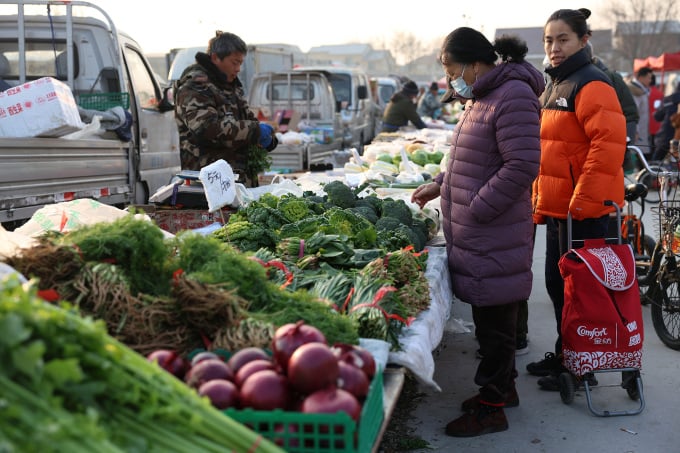
People buy food at a market in Beijing (China) in January 2024. Photo: Reuters
But with graduates unable to find jobs, property owners and workers facing pay cuts, the economy appears to be contracting. The crisis of confidence is making consumers reluctant to spend and businesses reluctant to invest and hire, which could affect China’s economic potential in the long term.
Zhu Tian, professor of economics at the China-Europe International School in Shanghai, said that the theory of recession (two consecutive quarters of GDP decline) should not be applied to developing countries with large investment-to-GDP ratios like China.
“If you talk to 10 people, seven will say they had a pretty bad year. The government will not let this continue, of course,” he said. Zhu urged the government to increase stimulus to pull the country out of the “dangerous spiral” of falling confidence. The drop in confidence is hitting young people trying to enter the job market hard.
According to data released in June 2023, more than 25% of young people aged 16-24 in China were unemployed, equivalent to about 25 million people. The latest data released on January 17 showed that this rate was only 14.9% in December 2023. However, the latest surveys show that the 16-24 group is the most pessimistic of all age groups.
Many people are earning less than expected as companies cut costs amid falling domestic demand. The average salary offered by companies in China’s 38 largest cities in the final quarter of last year fell 1.3% from a year earlier, according to recruitment firm Zhaopin.
With an economy that has grown 60-fold since the 1980s, this is a major psychological turning point. China’s success has been built largely on massive investments in manufacturing and infrastructure. But this model is generating more debt than it did a decade ago. Total debt in China is now huge.
Meanwhile, students in China are mainly trained for the service sector, which requires high skills, rather than factory or construction work. Therefore, the decline in household spending, along with the government's tightening control over the financial, technology and education sectors in recent years, has reduced opportunities for students.
Janice Zhang (34 years old) worked in the technology industry until the end of 2022. Then she quit her job due to family matters. Zhang is confident that with her experience and qualifications, she can easily find a new job.
However, she was only offered a social media position and had to work 15-hour shifts. Zhang had to quit shortly after.
The current economic situation makes her feel "unable to control my own destiny." "What I'm trying to do right now is just ease the disappointment that tomorrow will bring," she said.
Vincent Li, the owner of a high-end cafe in Shanghai, also feels like he has fallen out of the middle class. As Chinese people cut back on spending, they prefer cheaper coffee. The two apartments he bought for 4 million yuan ($558,000) in 2017 on the island of Hainan have been vacant for three years. “The real estate market is saturated,” he said.
In China, about 70% of household savings are poured into real estate. Real estate agents say apartments in some cities have lost as much as 70% of their value since the industry began to crash in 2021. This has made people feel poorer and less willing to spend.
The real estate sector, which contributed nearly 25% of China's economic activity at its peak, is now seen as the biggest risk in the country's escape from the middle-income trap.
"The old growth drivers are declining rapidly, making it difficult for new drivers to develop. This is the biggest risk, which could cause China to get stuck in the transition process," said Yuen Yuen Ang, a professor at Johns Hopkins University.
In addition to internal problems, recent diplomatic tensions with the West have also affected foreign investment in China. The US chip embargo on China has caused business consultants like David Fincher to lose income.
Fincher, who is based in Shanghai, is considering moving abroad because of the political and legal risks. “I’m like a shrimp in a pot of water. The water is getting hotter, and I can’t just sit still. I’m as worried about China as everyone here,” he concluded.
Ha Thu (according to Reuters)
Source link



![[Photo] Binh Trieu 1 Bridge has been completed, raised by 1.1m, and will open to traffic at the end of November.](https://vphoto.vietnam.vn/thumb/1200x675/vietnam/resource/IMAGE/2025/10/2/a6549e2a3b5848a1ba76a1ded6141fae)




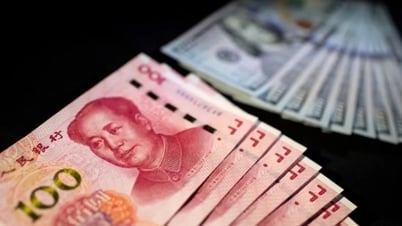




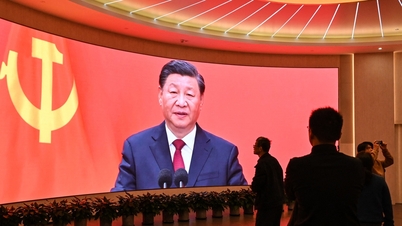


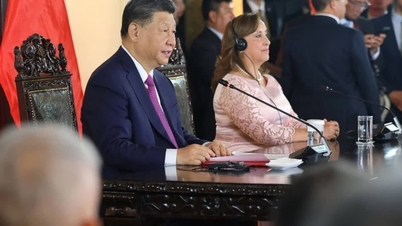
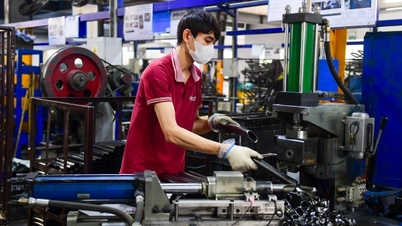





















































































Comment (0)